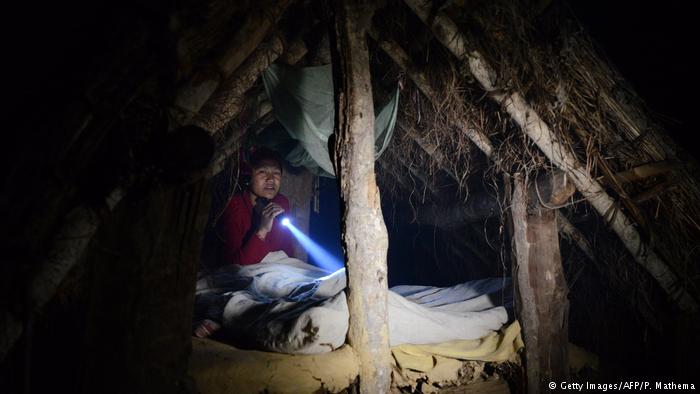Urmila and her courage: How a child slave freed herself
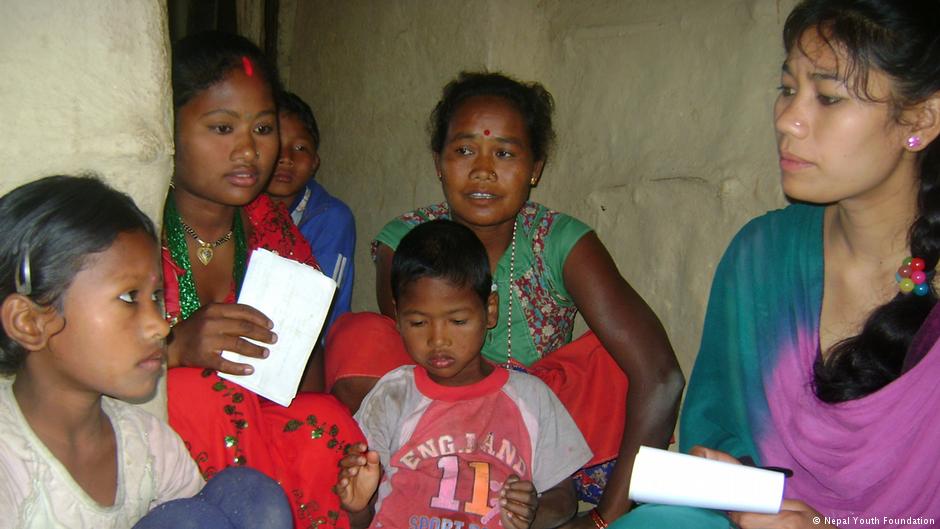
Urmila was never allowed to be a child. She was already a slave when she was six. She worked for a rich family. The experience left a trace but did not break her. She has declared war against the child slavery system in Nepal.
She was one of the “lucky” ones. She was “just” insulted and beaten up, no more than that. Many other slaves experienced even worse experiences. Urmila Chaudhary, 27, was very calm when she said this. She was just stating facts.
She spoke softly but with a strong voice when she talked about her life, a lonely life that was full of torture for many years.
She spent almost 12 years in captivity as a bondmaid and servant of rich people in Kathmandu, the capital of Nepal. She was a so-called Kamalari, one of thousands of girls from Tharu tribe sold by their parents because of financial misery. About 7 percent of the Nepali population is Tharu. They are generally poor and live from agriculture but oftentimes it is not enough. So over the centuries, a tradition has evolved where daughters are sent to the city for money. For parents, this brings in additional income and one less mouth to feed. But the girls lose their childhood brutally. Kamalari means “hardworking woman” but the fact is they are still children.
War against hardened structures
Urmila Chaudary gained her freedom 10 years ago and has been campaigning against the tradition ever since. The Kamalari was actually banned by law in 2013 but it continues. Chaudary goes out onto the streets to raise awareness, in the hope that other girls will not have to endure what she went through.
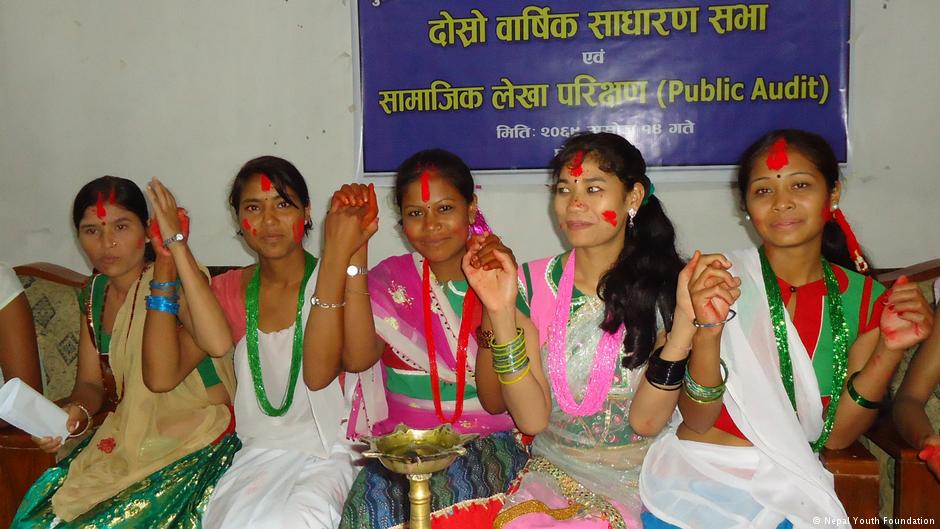
Urmila (fourth from left) and the other from Freed Kamalari Development Forum
She has even founded an organization that helps to free slaves and give them a second chance in life. It survives on donations and she refuses to be slowed down in her efforts by societal or political pressures.
Alone in the city
“I don’t remember the day when I was sold by my family,” she recalls. “I was too young. I can remember that my father was very sick. My parents didn’t have money to pay for treatment in the hospital.” At that time a stranger came to their village. He offered Urmila’s family an annual income of 4,000 rupees (about 40 dollars) in exchange for her servitude in his daughter’s household.
The money sealed her fate, just as it had her two sisters’ before her. Urmila landed with a family which had two children. She had to work between 14 and 16 hours a day. She had to do all the household chores and cooking. At the beginning, she was too small to see what was in the pans and would have to climb onto the stove to prepare food. She also had to look after the children. “One of the children was as old as me, and the other one was a bit older. I had to take them to school every day and carry their bags. It was physically very hard.”
Even harder was the fact that she saw them going to school without being able to go herself. “These children have everything. They can play and can be children. Why not me?” she would think to herself.
Unbridled thirst for knowledge
The loneliness was almost unbearable and especially at night. She would cry herself to sleep most days. But she was certain that one day she would come back to her family. “I could not read nor write. But I was convinced that one day I will be successful. Not only for myself, but also for the other Kamalari girls.” It was a declaration of war. She asked the children of the family to teach her how to read.
She stayed eight years with the family before being passed to a single woman, a high-ranking politician. It was worse in this household, she says, because her mistress would shout at her and give her bad food. She was not allowed to look her in the eye.
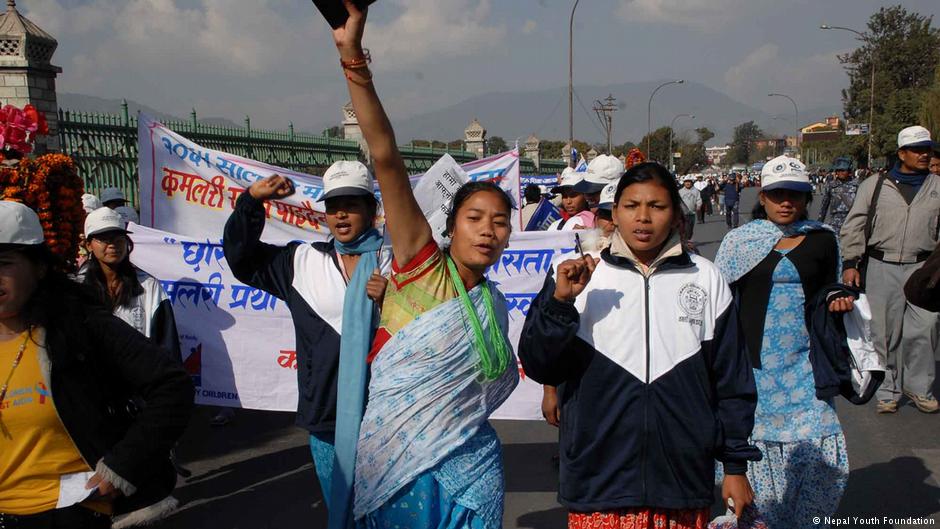
Going home after 10 years
Urmila had no contact with her family for many years. Later she found out that the promised money had only been given for two years. “They didn’t have the courage to claim the money,” she explains almost apologetically. “Tharu are very obedient and dutiful people.”
She came home thanks to a coincidence. She saw her brother on TV – he was taking part in a demonstration against forced labour. She begged her mistress to let her meet him. When she said no, Urmila was persistent. In the end, the mistress agreed but insisted on accompanying Urmila.
A couple of weeks later, her mistress gave her permission to go home with her brother on condition that she returned. “I did not go back. I could not. It was like a prison.” Yet, she still feels guilty that she did not go back even after she had gone through.
Taboo and the question of guilt
When she first saw her mother again, they both cried. She has never spoken with her parents about her experience and does not want to. “It would hurt them to know how I was mistreated. But they know a bit through the media and other people that asked them about me. But I have never said anything to them.”
Urmila defends her parents today. “When they sold me and my sisters they could not imagine what was waiting for us. For them it was normal to give away their children. For us Tharu it is a tradition of many generations.” However, she admits that she is sometimes angry because she lost her childhood. “I could not grow up with my parents’ love.” But she tries to forget this kind of thought and tells herself that her parents had no other choice.
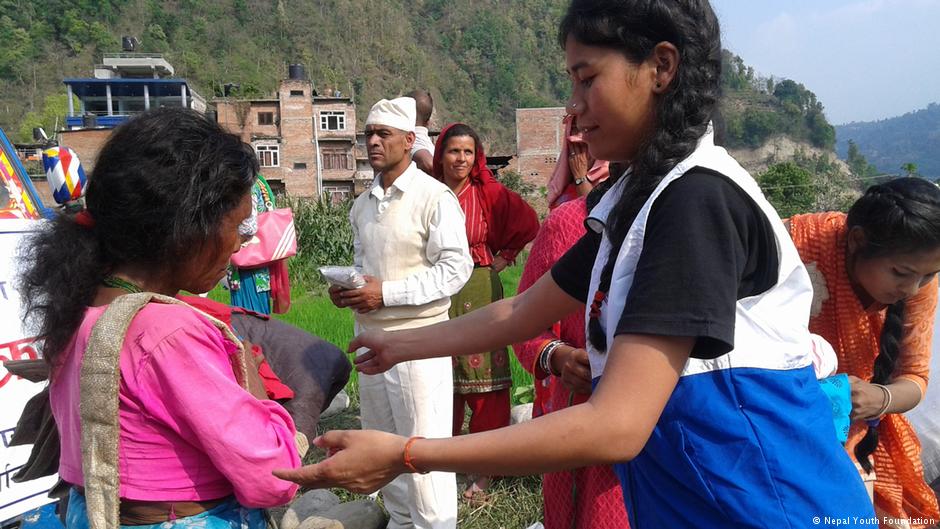
Give up? No way!
After getting her freedom back, she wanted more. She wanted a life. The life that she had always dreamed of even though she was realistic enough to know that her chances were limited. She had never gone to school but wanted to become an lawyer. So she started going to classes with much younger children but was not bothered by the surprised glances and inquisitive questions. At the same time, she set up her own organization to free girls from slavery. Freed Kamalari Development Forum (FKDF) is financed by donations. “What she has achieved is remarkable,” says Irene Jung from Terre de Femmes. FKDF and other organizations have freed 13,000 girls in the past few years.
They go to villages and ask which families have how many daughters and where they are. They are very persistent and often able to find out where the missing girls are. They also control cross-country buses and look for unaccompanied girls on their way to the cities.
Moreover, they organize theatre performances in villages and describe their experience in plays to show parents what actually happens to their daughters. Sometimes mothers or fathers come to Urmila and tell her that their daughters are also Kamalari. “I had no idea what was going to happen to them. Please help us to free them, they say.” Urmila likes to play the role of the mistress in the theater performances. Irene Jung thinks this is a way of processing her experience.
Longterm targets
There are no certain figures for the amount of Kalamari girls there are. “According to official estimates there are only 150 left, ” says Irene Jung but some believe it is more.
Although the Kamalari-system was banned officially several years ago, the structures in society have not changed fundamentally. So Urmila has not yet achieved her target.
The girls that she has helped to free receive support and can go to school and take part in training programs. The organization has also founded 40 cooperatives and set up a project to give micro-credits to 6000 former Kalamari.
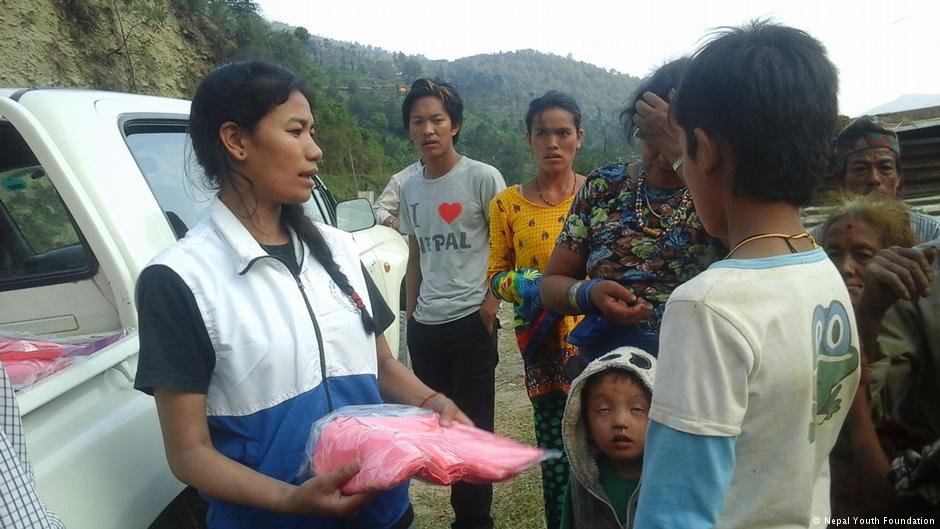
Big Ambition
“Urmila has huge empathy. You can see it every time she talks to girls whom she freed,” says Jung admiringly. She makes what seems impossible possible. She has learnt how to read and write. She speaks English and has received her high-school diploma.
She is proud of her education. But is she happy? “No”, she says. She doesn’t think that she can ever consider herself a happy person. “But at least now I feel like a human being again.”
A few months ago, Urmila Chaudary received the International Human Rights Award from the city of Esslingen in Baden-Württemberg, Germany.
Author: Esther Felden
Editor: Marjory Linardy, Anne Thomas
_____
WTO RECOMMENDS
The Purity Myth
Where does a woman’s worth lie? In her brains? In her heart? In her soul? Between her legs. Some would claim! Society has long wanted to control women’s sexuality in the name of culture and religion.
Maiti Nepal – Giving Hopes and Dreams for Many Girls
Sita’s face beams with happiness as she dances (picture). After enduring severe hardship, a group of Nepali girls are now on a tour performing traditional dance across Germany, Austria and Switzerland. DW takes a look at how the Maiti organization offers them aid and shelter.
Nepali Women – Caught in a Terrible Vortex
Dhankumari, 57, lost her belongings and livestock in the killer earthquake that shattered her home on April 25. After the next tremor on May 12, she is even more worried. She is only one of many. Thousands of women and children are affected by Nepal’s devastating earthquake and do not know how to continue with their lives. Relief workers warn of the threat posed to these women by sex traffickers.






